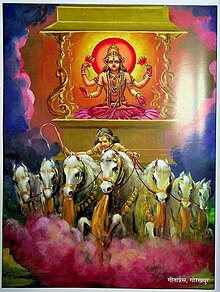Punyaham
 From Wikipedia the free encyclopedia
From Wikipedia the free encyclopedia

Punyaham (पुण्याहम्, Puṇyāham) or Punyaha (Puṇyāha) is a cleansing ritual observed by Hindus.[1][2]
Performed by Brahmins,[3] it is performed for the consecration of a house before its occupation by residents. After a site is selected as suitable for construction, the priest offers a sacrifice, and pronounces the name of the ceremony, puṇyāham, “this is an auspicious day”, to the sounding of musical instruments. He repeatedly whispers a mantra, the object of which is to request malicious spirits, asuras, and devas who may inhabit the site to leave, and find their abode elsewhere. He then takes a pot, fills it with earth mixed with cowdung white reciting mantras, and sows seeds within it.[4]
Etymology[edit]
Punyaham (पुण्याहम् - पुण्यञ्च तदहश्चेति) is a Sanskrit word that means 'an auspicious day' or 'sacred day'.[5][6][7]
Types[edit]
Punyaham is of two types: Nandeemukha Punyaham and Suddha Punyaham. The "Nandeemukha Punyaham" is performed prior to most of the important rituals for improving sanctity of the ritual. "Sudhha Punyaham" is carried out for eliminating "Asuddhi" (impurity or pollution), while "Ardha Punyaham" (half-punyaham) is a shortened version of the "Suddha Punyaham".
Mantras[edit]
The Punyaha mantras are integrated form of selected mantras from the Taittiriya Samhita and the Taittiriya Brahmana.
References[edit]
- ^ Sathe, J.D. (2004). Gr̥hya Rituals of Sāmavedins: As Propounded by Gautama. Pratibha Prakashan. p. 36. ISBN 978-81-7702-087-8. Retrieved 10 June 2019.
- ^ Bibliotheca Indica, Volume 251. India: Baptist Mission Press. 1929. pp. 13–15.
- ^ Bhat, Chandrashekhar (1984). Ethnicity and Mobility. Concept Publishing Company. p. 129.
- ^ www.wisdomlib.org (2018-02-21). "Punyaha, Puṇyāha, Punya-aha: 15 definitions". www.wisdomlib.org. Retrieved 2022-11-27.
- ^ Bengal: Past and Present, Volume 104. Bengal (India): The Society. 1985. p. 4.
- ^ Hüsken, U.; Sweetman, W.; Krüger, M. (2009). Viṣṇu's Children: Prenatal Life-cycle Rituals in South India. Ethno-Indology (in Latin). Harrassowitz Verlag. p. 84. ISBN 978-3-447-05854-4. Retrieved 10 June 2019.
- ^ Śaṅkarācārya (1980). The hymns of Śaṅkara. Delhi: Motilal Banarsidass. p. 116. ISBN 978-81-208-0094-6. OCLC 8596720.